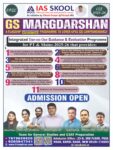
|
When considering the array of 51 optional subjects for the UPSC Mains Examination, Sociology consistently stands out as a top choice. Its inherent appeal lies in its accessibility and intriguing exploration of humanity and society, catering even to students from Science and Commerce backgrounds. With a well-defined UPSC sociology syllabus comprising only 13 units, Sociology can be comprehensively covered within 4 to 5 Month Comprehensive “Foundation to Finale” Classroom Programme, Many of Our Sociology Foundation Course Students have Cleared CSE 2023- Kajal Singh, First Attempt (Age 22) Mahi Sharma, First Mains (Age 23), Anand Sharma First Mains and Many Others. Previously also Many students like IAS Pradeep Singh, IAS Ashish, IPS Bindu Madhav, IPS Aparna Gautam, IPS Shahnaz Illyas got Success in CSE in First Attempt with Sociology Optional.
IAS Medha Anand, has get 310 marks in her optional subject sociology, 156 in paper – 1 & 154 marks in Paper-2 in CSE 2023. Notably, Sociology for UPSC has garnered a reputation as one of the Highest scoring optional subjects in the UPSC Main Examination, with numerous candidates consistently achieving 300+. Its popularity is evident in the fact that a significant proportion of top 100 rankers opt for Sociology as their optional subject, showcasing its high scoring potential, particularly for those not from sociology backgrounds. Moreover, relevance of Sociology Optional Syllabus for UPSC extends beyond the examination hall, enriching understanding across various aspects of life, from social and economic to political and cultural domains. In recent times, Sociology Optional has gained traction, aligning with the evolving trend of the UPSC Mains towards conceptual analysis. Unlike other optional subjects with unpredictable question patterns, Sociology offers stability and predictability, making it an attractive choice. This adaptability, coupled with its concise syllabus and relevance to both academic and social spheres, positions Sociology as the ideal optional subject for engineers as well as optional subject for commerce graduates and optional subject for science graduates seeking success in the Civil Services Examination. For those pursuing Sociology as an optional subject, accessing comprehensive Sociology optional notes and few good Sociology optional books, and previous years’ UPSC sociology optional question papers is pivotal for thorough preparation. Additionally, for aspirants seeking guidance, renowned educator Vikash Ranjan Sir at TRIUMPH IAS coaching institutes in Delhi, offer valuable support and resources. Vikash Ranjan Sir is the Best Sociology Teacher and Triumph IAS is the best sociology coaching in Delhi. If you are away from Old Rajendra Nagar, Delhi, you can still complete Journey of UPSC civil service preparation through online Sociology class The scientific nature of Sociology, coupled with its direct applicability to daily social interactions, renders it a subject that can be comprehended without extensive reference materials, distinguishing it from other optional subjects requiring extensive reading and research.
|
Myth of Meritocracy and Caste-Based Disparities in the Indian IT Sector
Relevant for Civil Services Examination
Myth of Meritocracy and Caste-Based Disparities in the Indian IT Sector
Why in News?: The Indian IT sector, globally lauded for its meritocratic approach, faces criticism for perpetuating caste-based inequalities despite its emphasis on individual talent and qualifications. This issue calls into question the perceived fairness of recruitment practices and workplace dynamics within the industry.
Caste-Based Disparities in the IT Sector
Understanding Meritocracy in the IT Sector
Meritocracy is the principle where individual achievements and abilities determine success. The Indian IT sector champions this ideal by focusing on:
- Rigorous recruitment processes based on technical skills and educational qualifications.
- An ecosystem rewarding innovation, productivity, and performance.
However, meritocracy in practice often overlooks structural inequalities stemming from historical and socio-economic disadvantages, especially for marginalized communities. |
- Homogeneous Workforce Composition: Studies reveal that the IT workforce predominantly comprises individuals from urban, middle-class, and upper-caste backgrounds.
- This composition indicates systemic barriers for marginalized groups, particularly Scheduled Castes (SC), Scheduled Tribes (ST), and Other Backward Classes (OBCs).
- Disparities in Educational Access: Quality education, a prerequisite for IT jobs, remains inaccessible for many marginalized communities:
- Rural and lower-caste students face challenges in reaching prestigious institutions like IITs or NITs due to socio-economic constraints.
- Lack of access to private coaching further widens the gap in skill acquisition.
- Representation in STEM fields: Dalits and marginalized caste groups remain underrepresented in science, technology, engineering, and mathematics (STEM) education.
- Recruitment Practices: Hiring often prioritizes:
- Degrees from elite institutions like IITs or IIMs.
- Candidates with polished communication skills, often linked to urban schooling and privilege.
- These practices indirectly disadvantage candidates from non-urban or lower socio-economic backgrounds, where access to such resources is limited.
- Workplace Discrimination: Marginalized employees often encounter:
- Subtle biases: Exclusion from key projects, unequal mentoring opportunities.
- Caste-based harassment: Reports of microaggressions and prejudices in workplace interactions.
- Career stagnation due to limited networking opportunities within caste-dominated hierarchies.
Challenges in Addressing Disparities
- Structural Inequality: Historical inequities in education and employment have resulted in intergenerational disadvantage for marginalized communities.
- Even when individuals meet qualifications, systemic biases may affect their inclusion and growth.
- Lack of Transparency: Companies rarely disclose data on caste representation in their workforce.
- Diversity initiatives often focus on gender or geographic representation, leaving caste disparities unaddressed.
- Stigma Around Reservation Policies: Reservations in education and employment for SC/ST/OBCs are often stigmatized, with meritocratic ideals being used to discredit affirmative action policies.
- This stigma reinforces stereotypes about the competence of marginalized caste individuals.
- Limited Legal Framework: While laws against caste discrimination exist, they are often poorly implemented in private sector workplaces.
- The Scheduled Castes and Scheduled Tribes (Prevention of Atrocities) Act, 1989 applies primarily to overt acts of discrimination, leaving subtle biases unaddressed.
Implications for Meritocracy and Inclusion
- Questioning Meritocracy: Merit cannot be assessed in isolation from social context. Marginalized individuals often start from a position of disadvantage, which affects their ability to compete on equal terms.
- Overlooking systemic barriers perpetuates inequality under the guise of meritocracy.
- Impact on Social Mobility: The IT sector, as a potential vehicle for upward mobility, fails to fully deliver on its promise for marginalized groups.
- Caste-based exclusion undermines the sector’s potential to bridge socio-economic divides.
- Undermining Diversity: A lack of caste diversity limits the sector’s ability to innovate and represent India’s demographic diversity.
- It also hinders social equity, a key driver for sustainable development.

Policy Recommendations
- Inclusive Recruitment: Broaden hiring criteria to include candidates from diverse educational and socio-economic backgrounds.
- Partner with institutions in marginalized regions to build talent pipelines.
- Affirmative Action: Encourage private sector adoption of reservation policies for SC/ST/OBC candidates.
- Offer incentives for companies demonstrating progress in diversity and inclusion metrics.
- Workplace Sensitization: Conduct regular training programs to address implicit biases and promote a culture of inclusivity.
- Establish zero-tolerance policies for caste-based discrimination, supported by robust grievance redressal mechanisms.
- Data Transparency: Mandate companies to disclose workforce diversity data, including caste representation, to track and address disparities.
- Strengthen Legal Frameworks: Expand the scope of anti-discrimination laws to include subtle workplace biases.
- Ensure strict enforcement of existing laws against caste discrimination in the private sector.
Case Studies and Examples
- Caste Discrimination in Global Tech Firms: In 2020, a Dalit engineer filed a lawsuit against Cisco in the U.S., alleging caste-based harassment by colleagues of Indian origin. This highlighted how caste dynamics persist even in global contexts.
- Diversity Initiatives: Some Indian companies, like TCS and Infosys, have started diversity programs focusing on gender and geographic representation. However, caste diversity remains largely absent from these initiatives.
- Role of Education: Institutions like IITs and NITs, though diverse in student representation due to reservations, often fail to translate this diversity into equitable placements in the IT sector.
Way Forward
- Recognizing the Problem: Acknowledge that caste disparities exist even in sectors perceived as meritocratic.
- Initiate honest conversations about caste inclusion at organizational and industry levels.
- Collaborative Efforts: Government, academia, and the private sector must work together to address structural barriers and foster inclusion.
- Equity over Equality: Focus on creating a level playing field through targeted interventions, recognizing that equality of opportunity requires equity in access and resources.
Conclusion
The myth of meritocracy in the Indian IT sector obscures the systemic barriers faced by marginalized communities. True meritocracy cannot exist without addressing structural inequities, ensuring access to quality education, and creating inclusive workplaces. By actively working to dismantle caste-based disparities, the IT sector can uphold its promise of being a transformative force for India’s socio-economic development. For UPSC aspirants, this issue provides a critical lens to understand the interplay between social justice, economic growth, and policy-making in modern India.
The End of the Blog: Myth of Meritocracy and Caste-Based Disparities in the Indian IT Sector

|
|
Frequently Asked Questions by
UPSC Sociology Optional Students
How to prepare for the Sociology Optional without coaching?
Understand the syllabus thoroughly: Familiarize yourself with the entire syllabus for both Paper I and Paper II. Download the official UPSC syllabus and use it as your roadmap. You can attend Sociology Orientation Lectures by Vikash Ranjan sir on YouTube
Build a strong foundation: Start with introductory textbooks and NCERT books to grasp core sociological concepts. You can start with Introduction to Sociology books
Choose reliable study materials: Select high-quality textbooks, reference books, and online resources recommended by experts. You can opt for Vikash Ranjan Sir Notes too.
Develop a study schedule: Create a realistic and consistent study schedule that allocates dedicated time for each topic. Stick to it and track your progress.
Take notes effectively: Don’t just passively read. Summarize key points, create mind maps, or use other note-taking techniques to aid understanding and revision.
Practice answer writing: Regularly write answers to past year question papers and model questions. Focus on clarity, structure, and critical thinking. Evaluate your answers for improvement.
Seek guidance: You can take free Mentorship on Sociology Optional preparation by Vikash Ranjan sir. Connect with Vikash Ranjan sir (7303615329) to share strategies, ask questions, and stay motivated.
Can I prepare for Sociology Optional without coaching?
Absolutely! Many aspirants successfully clear the exam through self-study. However coaching can provide structure and guidance, for time bound preparation.
What are the benefits of preparing without coaching?
Cost-effective: Coaching can be expensive, and self-study allows you to manage your resources efficiently.
Flexibility: You can tailor your study plan to your individual needs and pace.
Independence: You develop critical thinking and research skills, valuable assets for your career.
What are the challenges of preparing without coaching?
Discipline and motivation: You need self-discipline to stay on track and motivated without external guidance. Coaching and Teacher keeps you motivated.
Access to resources: You may need to do extra research to find quality study materials and answer-writing practice opportunities. Teacher help you on this respect.
Doubt clearing: You might lack immediate access to someone to address your doubts and questions. Teacher like Vikash Ranjan sir is accessible to his students 24×7 Mo- 7303615329
What additional resources can help me?
Vikash Ranjan Sir’s YouTube channel and website: Offers free Sociology lectures, study materials, and guidance.
Triumph IAS website: Provides past year question papers, model answers, and other helpful resources.
Public libraries and online databases: Utilize these resources for access to relevant books, journals, and academic articles.
Follow us :
 https://www.instagram.com/triumphias
https://www.instagram.com/triumphias
 www.triumphias.com
www.triumphias.com
 https://www.youtube.com/c/TriumphIAS
https://www.youtube.com/c/TriumphIAS
 https://t.me/VikashRanjanSociology
https://t.me/VikashRanjanSociology
















